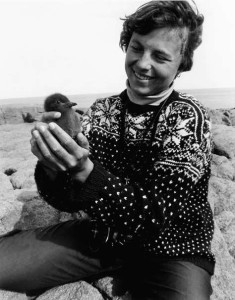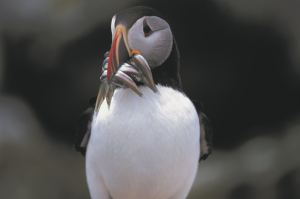 Anne Hallowell Reich was a Staff Member with QLF’s Marine Bird Conservation Project in Harrington Harbor, where she worked with Dr. Kathleen Blanchard in the early 1980s. During her time with the program, Anne led field ecology programs for local children on St. Mary’s Island, helped generate a community commitment to seabird conservation, and conducted research that would become the basis for her master’s degree in education at Cornell University. Since then, Anne has engaged in a life-long career as a community steward, environmental educator, writer, and mother. Anne and her husband, Peter Reich, live along the St. Croix River in Minnesota, where bald eagles and trumpeter swans are their neighbors.
Anne Hallowell Reich was a Staff Member with QLF’s Marine Bird Conservation Project in Harrington Harbor, where she worked with Dr. Kathleen Blanchard in the early 1980s. During her time with the program, Anne led field ecology programs for local children on St. Mary’s Island, helped generate a community commitment to seabird conservation, and conducted research that would become the basis for her master’s degree in education at Cornell University. Since then, Anne has engaged in a life-long career as a community steward, environmental educator, writer, and mother. Anne and her husband, Peter Reich, live along the St. Croix River in Minnesota, where bald eagles and trumpeter swans are their neighbors.
QLF Experiences
Marine Bird Conservation Project, Harrington Harbor, 1980, 1981
Community Service, St. Mary’s Island, 1982, 1983
I grew up in a family of naturalists, surrounded by wild animal pets and a spirit of curiosity and adventure about the natural world. We children spent hours freely exploring the woods, fields, and pond near our New Jersey home. I developed a deep love for nature that inspired me to study field biology in college. When I was twenty-one, I began a summer job with the National Audubon Society on Hog Island, Maine, that would change my life, introducing me to a vibrant community of people, including Kath Blanchard, who were committed to environmental stewardship, teaching, and research.
Post-college, Anne taught elementary science at the Potomac School, McLean, Virginia, and continued summer work with Audubon. She brought seabird research into the classroom, engaging young students with a puffin behavior study that she and Kath conducted in Maine. By this time, Kath had joined QLF, and her Marine Bird Conservation Project was taking off. Anne would soon join Kath for summer work with the project.

QLF Intern Anne Hallowell Reich holding a Black Guillemot (Cepphus grylle) chick, Marine Bird Conservation Program, St. Mary’s Island, Quebec North Shore. QLF Archives
My time with QLF provided new perspectives on teaching and community engagement that would eventually impact my work later in life. QLF friends Kath, Larry Morris, and Tom Horn also introduced me to the possibility of pursuing graduate studies in natural resources and environmental education.
Anne left classroom teaching to co-author and illustrate a field guide to native ferns, Fern Finder, and then enrolled in graduate studies at Cornell University. She returned to the Quebec North Shore as a QLF-affiliate to conduct research for her master’s in education. Her research, Environmental Education and the Illegal Harvest of Seabirds on the Quebec- Labrador Coast, built on the work she had done with QLF. While at Cornell, Anne met her husband, Peter Reich, who is currently a University of Minnesota forestry professor studying impacts of climate change on terrestrial ecosystems.

Atlantic Puffin (Fratercula arctica). Dr. Kathleen Blanchard directed the Marine Bird Conservation Program for 20 years. Through it, dozens of interns and volunteers received their first experience in wildlife research and environmental education. Photograph by Greig Cranna
Anne’s time with QLF was an early milestone in what would become a long and rich career. She worked as an editor of educational publications for the Wisconsin Department of Natural Resources and as a prairie ecology educator in public schools in White Bear Lake, Minnesota, where she organized planting of school prairie gardens and developed related science activities. Much of her focus has been on volunteer community-sustainability projects, which have included assisting with the Minnesota GreenStep Cities program in her town; serving as botanist for a historic sawmill land restoration project; helping initiate construction of, and coordinating tree planting for, a natural playground at an elementary school; working with the community to raise funds to install a 10 kW wind turbine at a local high school for education and clean energy generation; helping create a community garden; coordinating community global climate and energy education programs; serving on the library board; and working on behalf of public education funding initiatives.
In reflecting on her time with QLF, Anne concludes: While I did this kind of work through the years, there were certain lessons from my time at QLF that always remained relevant. Among these were the importance of basing projects in the community context, the need to listen, the power of polite persistence, and the imperative of engaging key players who can share ownership in a project’s process and its successes. When people work together, good things happen, and not only can it be satisfying to share in the accomplishments, it can also be great fun. Engagement in environmental stewardship is every bit as important in small town Minnesota as it was in small fishing communities along Quebec’s beautiful North Shore. Everything is connected.




